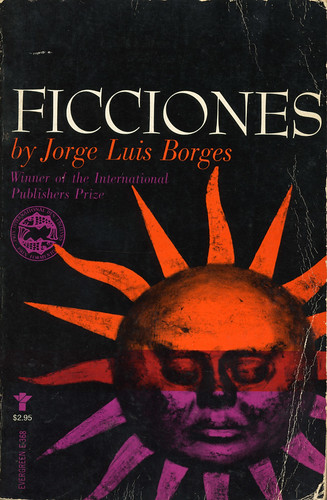
I mentioned in an earlier post that I'm rereading some selected Borges short fiction. Today I reread "The Approach to al-Mu'tasim," which is one of my favorites, and, I think, the quintessential Borges story. Borges once wrote that he saw no reason in writing a five-hundred page novel to express an idea that he could relate orally in five minutes. "The Approach to al-Mu'tasim" is an academic book review of a novel that doesn't exist, complete with footnotes, references to other works, and white-tower snootiness. The fictional novel, The Conversation with the Man Called Al-Mu'tasim: A Game of Shifting Mirrors, tells the story of a law student in Bombay who has rejected the old-school Islamic faith of his family. During a protest, the student murders (or thinks he has murdered) a Hindu. I'll let Borges take it from here:
The underlying plot is this: a man, the fugitive student freethinker we already know, falls among the lowest class of people and, in a kind of contest of evil-doing, takes up their ways. All at once, with the wonder and terror of Robinson Crusoe upon discovering the footprint of a man in the sand, he becomes aware of a sudden brief change in that world of ruthlessness - a certain tenderness, a moment of happiness, a forgiving silence in one of his loathsome companions. 'It was as though a stranger, a third and more subtle person, had entered into the conversation.' The hero knows that the scoundrel he is talking to is quite incapable of this unexpected turn; he therefore deduces that the man is echoing someone else, a friend, or the friend of a friend. Rethinking the problem, he arrives at the mysterious conclusion that 'somewhere on earth is a man from whom this light emanates; somewhere on earth a man exists who is equal to this light.' The student decides to spend his life in search of him.The law student goes on an epic journey, looking for this man by observing reflections of his soul in others. More mindfuckery follows: al-Mu'tasim, the man the law student searches for, is in turn searching for someone else in the same fashion, and that someone searches for someone else. To complicate matters, there are two versions of the manuscript, and Borges has read only the inferior one, which strips it of its more literary qualities and paints on a thick layer of allegory. Then there's the comparison to The Conference of the Birds, a real book of poems by Farid ud-Din Attar, which takes on a similiar theme. All of this, by the way, is compressed into about five pages. Whoa.
Borges best work is all about his weird mysticism--antiquities, ancient labyrinths, smoke and mirrors, sorcerors and kings seeking answers to the mysteries of the universe--and metafiction. "The Approach to al-Mu'tasim" supplies both. Here's a link to the story.
This story was translated by Norman di Giovanni, a friend of Borges who has received flak for his occasionally questionable translations (although a friend who's read Borges in Spanish thinks his translations are fantastic) and his strained relationship with Maria Kodama, Borges's widow and executor of his literary estate. Due to some crazy fluke in the contract for the English language rights, Giovanni wound up with 50% of the royalties of the collected and selected works of Borges (most translators get either a tiny percentage or merely an advance with no royalties). According to Kodama, Giovanni, once a bosom buddy of Borges, has wound up stealing millions of dollars from her husband's estate. She also prevented reprints of almost a dozen books written by or about Borges, until recently, just because Giovanni had a hand in translating material for them. Oh literary drama. (You'll notice the link to "The Approach to al-Mu'tasim" leads to Giovanni's website.)
If you haven't read Borges, I highly recommend you check him out. Very good stuff.

No comments:
Post a Comment